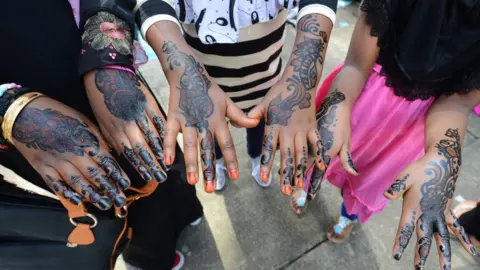Ramadan fast: Should children give up food and water?
German doctors are urging Muslim parents not to have their children fasting during the Islamic month of Ramadan, which this year starts on Tuesday evening.
The Professional Association of Paediatricians would rather parents explain to their children how "fasting is unhealthy for them".
Ramadan, which shifts according to the movement of the moon, is observed around the world by millions of Muslims. They abstain from food and drink between dawn and sunset for 30 days.
This year, the month coincides with longer days in early summer, which means people in Europe will be fasting for about 18 hours a day.
How does fasting affect children?
Children of the Muslim faith are expected to begin fasting once they have reached puberty, usually by the age of 14.
Younger children do not need to fast but German paediatricians say that many are encouraged to do so.
With this year's Ramadan falling during the "most important weeks of the school year", they warn fasting, and particularly the absence of fluids, could have a negative effect on performance in school.
"We always see very pale and unfocused children during Ramadan," doctors said in their statement. Some students came to see them straight from school, they said, after collapsing from "severe headaches or abdominal pain".
Doctors are not the only ones concerned. German teacher associations have also repeatedly warned of the tiredness Muslim children suffer while fasting in Ramadan, local media report.
Is fasting illegal or dangerous?
No national law or rule prevents children or teenagers from fasting.
"Even young Muslims are free to fast in Ramadan," Susanne Eisenmann, state minister for culture, youth and sports, told German media.
But she went on to say she saw it as a parent's duty to consider a child's health, especially those in elementary school.
"They have to make sure that their children can experience the fasting month in a healthy way," she said so that "performance and concentration skills in school do not suffer".
Individual institutions have made efforts to stop children from fasting in the past. In 2015, a primary school in London banned its children from fasting during Ramadan - a "stupidly foolish" action that one Muslim leader said could have spared the community bad press had the school simply spoken to parents.
The UK's National Health Service (NHS) says it is not harmful for children to fast, in an advice page about Ramadan.
It does advise against young children, aged seven or eight, fasting, adding: "It's a good idea to make children aware of what fasting involves and to practice fasting for a few hours at a time."
Do all Muslims have to fast?
Ramadan is seen as a spiritual time for reflection, improvement and increased devotion and worship of Allah, the Arabic word for God.
Fasting during this time is one of the five pillars of Islam, and all adult Muslims are expected to do it, reading and reflecting on the entire Koran, the holy book, and abstaining from smoking and sex during fasting hours.
But it is not just children who do not have to fast. Muslims who are ill, travelling, elderly, pregnant, breastfeeding, diabetic or menstruating are excused by Islamic law.
Adults can either make up for any of the 30 days of fasting at another time in the year or pay fidyah, which is a religious donation of food or money when a fast is not kept.
For those who can fast, every day is started with prayer and a pre-dawn meal called suhur, and fasting is broken with a sunset meal called iftar.
At the end of Ramadan, which will be on 14 June, there is a three-day celebration called Eid al-Fitr, which is marked with special foods, new clothes and presents for children.
 Getty Images
Getty ImagesWhat do people who fasted as children think?
Riyas Izzedeen, who grew up in Sri Lanka and now lives in London, first fasted when he was seven. He says he didn't want to feel left out while his friends and family were observing Ramadan.
"We didn't fast the whole month at aged seven - we did maybe one day a week or at the weekend, but if it was a school day, I was allowed to break my fast if I said I couldn't continue," he says.
"We didn't treat Ramadan days any differently to normal days. We spent the day outside playing, usually running around playing a lot of physical games, riding our bikes and just being kids.
"Of course we would get really tired and thirsty and we would start counting the minutes until sunset, but other than that we didn't suffer any lasting negative effects."
Mr Izzedeen, who is 40, now has a seven-year-old daughter and says he would not ask her to fast but would let her if she wanted to.
